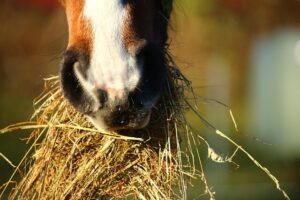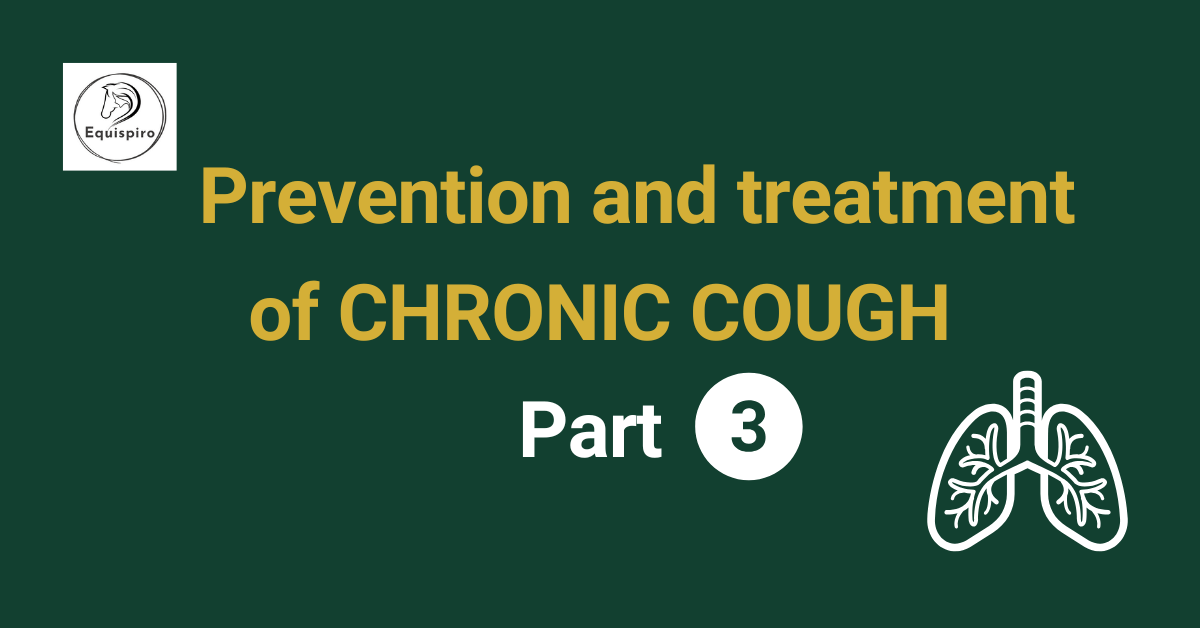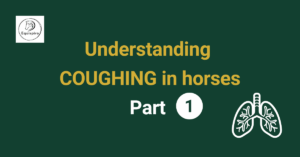Part 3 of our series on equine respiratory health
Chronic cough in horses is a common challenge for owners, and knowing how to prevent and treat it is key to long-term respiratory health. So far in our series we have covered:
- What coughing is and why it’s important
- The most common causes of coughing in horses
- What to do if your horse starts coughing
- When you should call the vet and how coughs are diagnosed and treated
In this final part, we focus on long-term care and prevention. Because once the coughing has stopped, the work is far from over – especially if your horse is prone to allergies or asthma.
Find out in this article:
- How you can reduce the risk of coughing with smart, stable-friendly measures
- What is considered a chronic cough and why it needs to be treated
- How to recognise and respond to a coughing fit in horses with respiratory disease
- How to create a supportive, proactive plan for your horse’s breathing
Whether you’re treating a chronic cough or simply want to prevent future problems before they develop, this guide will help.
Let’s create a better breathing environment together – every day.
Prevention: How to avoid a cough in the first place?
While some causes of coughing are unavoidable, many can be prevented with smart, consistent management. This is particularly important for horses prone to allergies or asthma.

🌬️ Optimise the air quality
- Ventilation is the be-all and end-all – keep the stables airy, reduce dust formation
- Avoid sweeping with the horses in the stable
- Store hay and bedding outside the stables
🌾 Feed low-dust hay
- Steam or soak hay to reduce mould, dust and allergens
- Consider haylage or soaked pellets for very sensitive horses
- Never feed musty or poorly stored hay
🛏️ Choose the right bedding
- Avoid straw and dusty wood shavings
- Choose dust-free bedding such as cardboard, paper or low-dust shavings
- Clean the stables daily and watch out for ammonia odours
🏃♀️ Support the respiratory system through exercise
- Regular light exercise helps to loosen mucus and keeps the lungs healthy
- Horses that are stabled benefit from hand-walking when exercise is not possible
💧 Hydration is important
- Make sure that fresh, clean water is always available
- Consider adding electrolytes in hot weather or after training
- A hydrated horse has thinner mucus, which dissolves more easily
💉 Follow a vaccination and deworming schedule recommended by your vet
- Vaccines protect against common respiratory viruses
- Strategic deworming helps prevent parasite-induced coughing
👀 Observe and react early
- Get to know your horse’s “normal state” – breathing rate at rest, recovery after work
- Recognising changes at an early stage means faster and more effective intervention
Preventing coughs is not just about preventing disease – it’s about giving your horse the best possible quality of life. With clean air, smart feeding and careful monitoring, you can make sure your horse can breathe well all year round.
⏳ Is it chronic? If the cough has been going on for too long
If your horse has been coughing for more than three to four weeks, the cough may be considered chronic – especially if it
- Occurs most days,
- Has not improved significantly, or
- Occurs repeatedly, even after a short break.
At this stage, it is unlikely that the problem is a simple irritation or a mild virus. A prolonged cough often means that there is inflammation or a chronic respiratory disease, such as:
- IAD (Inflammatory Airway Disease) – a mild but persistent lower respiratory tract problem,
- RAO (Recurrent Airway Obstruction, also known as severe equine asthma),
- or an unresolved bacterial infection or allergic reaction.

📌 What to do:
Don’t wait and see. A chronic cough should always be investigated – ideally through diagnostic tools like endoscopy or BAL – so that appropriate, targeted treatment can begin. Early action helps prevent permanent damage to the lungs.
If your horse has a chronic disease: What to do if the disease flares up again?
In horses that have already been diagnosed with respiratory problems – such as equine asthma (RAO or IAD) — a sudden cough can be a sign of a flare-up. Early action can prevent a full relapse and reduce the need for aggressive treatment.
🔄 Recognise the early warning signs
- Increased coughing, even if it is mild
- Slower recovery after work
- Slight nasal discharge
- Increased breathing effort (flaring of the nostrils, abdominal breathing)
- Restlessness or reluctance to lie down
🧭 Check possible triggers
- Have you harvested a new bale of hay?
- Has the weather changed (hot, humid or stormy)?
- Is the stable dustier than usual?
- Has the horse been moved or stabled near a dusty area?
🧰 Immediate management steps
- Reduce or stop work for a few days
- Move to a better ventilated area or pasture
- Return to steaming or soaking the hay
- Re-introduce or adjust inhalation therapy if prescribed
- Increased monitoring (respiratory rate, symptoms)
📓 Keep a symptom diary
- Note daily cough frequency, breathing patterns and any environmental factors
- Helps to recognise patterns and makes vet visits more effective
🫁 Work with your vet on long-term control
- Discuss a treatment plan with your vet to maintain or flare up the disease
- Some horses benefit from seasonal adjustments (e.g. preventative treatment during pollen season)
- Regular follow-ups help to adjust medication if necessary

A cough in a horse with a chronic disease does not always mean that something has gone wrong- but it is a signal to reassess the situation and take action. With careful monitoring and quick adjustments, most flare-ups can be brought under control quickly and safely.
Final thoughts and encouragement for owners
Coughing in horses can be worrying – but it doesn’t have to be the start of something serious. The key is to know when and how to act. Whether it’s a one-off cough or a sign of a chronic condition, early treatment can make all the difference.
Remember:
- A cough is a message from your horse’s body- listen to it.
- Don’t ignore mild symptoms, especially if they persist or recur.
- If in doubt, ask your vet.
- Good management is often just as effective as medication.
If your horse is already living with a respiratory disease, you are not alone. With the right support, many horses can lead full, active lives- even with asthma or allergies. You just have to pay attention, adapt and trust your instincts.
📌 Further reading
- Steaming hay: advantages, disadvantages, how to do it right
- 9 summer strategies to help your horse breathe better
- What to do if your horse starts coughing?
👉 Need help treating your horse’s cough?
Discover more guides on our blog or follow us on Instagram or Facebook for more tips on respiratory care for horses.
Together we help horses breathe better.
Summary
A chronic cough doesn’t have to lead to lifelong problems – for you or your horse. With the right management, early recognition of coughing fits and consistent preventative care, many horses with sensitive airways can live well and feel comfortable all year round.
In this final instalment of our series, we have looked at the following topics:
- Proven strategies to reduce the risk of respiratory irritation
- What constitutes a chronic cough and why early action is important
- How to manage coughing episodes in horses with asthma or allergies
- How to build confidence and routine in airway care
Even small changes – such as steaming hay, improving ventilation or monitoring symptoms- can make a big difference.
✅ We conclude
We hope this three-part series has given you clarity, tools and confidence to better support your horse’s respiratory health.
🧾 Did you miss a part? You can catch up here:
- Part 1 – Understanding coughing in horses: Why you should never ignore it
- Part 2 – What to do if your horse starts coughing?
💬 Did you find it helpful? Share this series with a friend, vet or other horse owner- it could make a big difference to their horse too.
And don’t forget to follow us on Instagram, Facebook or Tiktok for more practical respiratory care tips throughout the year.
Healthy breathing starts with you.



